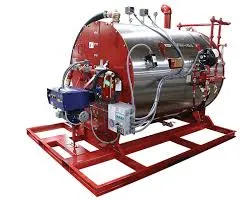
Dec . 01, 2024 21:30 Back to list
schematic diagram of steam boiler
Understanding the Schematic Diagram of a Steam Boiler
Steam boilers are essential components in various industries, providing heat and steam for processes ranging from electricity generation to food production. A steam boiler operates on the principle of converting water into steam through heat. Understanding the schematic diagram of a steam boiler is crucial for engineers, operators, and maintenance personnel to ensure efficient and safe operations. This article explores the key components and functions depicted in a typical schematic diagram of a steam boiler.
Key Components of a Steam Boiler
1. Boiler Shell The boiler shell is a crucial structural element that houses the water and steam. It is typically constructed from thick steel to withstand high pressures and temperatures.
2. Burner The burner is responsible for supplying heat to the boiler. It does this by burning fuel—such as natural gas, oil, or coal—in a controlled environment, providing the necessary thermal energy to convert water into steam.
3. Heat Exchanger In many boilers, heat exchangers transfer heat from the combustion gases to the water. They significantly improve the boiler's efficiency by capturing heat that would otherwise be lost to the atmosphere.
4. Water Feed System The water feed system includes pumps and piping that bring water into the boiler. It is essential for maintaining the water level, which is critical for safe operation.
5. Steam Drum The steam drum is where steam separates from the water. It maintains the steam pressure and ensures that only dry steam moves toward the distribution system.
6. Safety Valves These are vital safety components that automatically release steam if the pressure exceeds safe operating limits. They prevent potential boiler explosions due to excessive pressure build-up.
7. Blowdown Valve This valve allows for the removal of sediments and impurities from the boiler water, ensuring the longevity and efficiency of the boiler.
8. Condensate Return Line After steam is used in a process, it often condenses back to water. The condensate return line directs this water back into the boiler for reuse, promoting water efficiency.
schematic diagram of steam boiler

Understanding the Operation
The operation of a steam boiler, as illustrated in a schematic diagram, typically follows these steps
1. Ignition and Combustion The burner ignites fuel, producing hot combustion gases.
2. Heat Transfer The heat generated is transferred to the water in the boiler through the heat exchanger. This process elevates the temperature of the water, ultimately leading to steam formation.
3. Steam Generation Once the water reaches its boiling point, steam is generated and accumulates in the steam drum.
4. Pressure Regulation As steam builds, safety valves monitor and regulate pressure to prevent any hazardous situations.
5. Distribution and Use The generated steam is then directed to various systems for heating, power generation, or other applications, while the leftover condensate is returned for reuse.
Importance of the Schematic Diagram
The schematic diagram is more than just a representation of components; it is an essential troubleshooting and design tool. By analyzing the flow of water, steam, and combustion gases, operators can diagnose issues, optimize performance, and ensure compliance with safety regulations. Each arrow and label within the diagram represents the interconnectedness of the system – a reminder that the steam boiler is a complex yet elegantly designed machine.
In conclusion, a steam boiler schematic diagram provides critical insights into the function and operation of a boiler system. By understanding the key components and their interactions, users can improve efficiency, ensure safe operation, and maximize the lifespan of their equipment. The significance of this diagram extends beyond mere representation; it serves as a vital resource for understanding and mastering steam boiler technology in various industrial applications.
-
High-Efficiency Commercial Oil Fired Steam Boiler for Industry
NewsJul.30,2025
-
High-Efficiency Biomass Fired Thermal Oil Boiler Solutions
NewsJul.30,2025
-
High Efficiency Gas Fired Thermal Oil Boiler for Industrial Heating
NewsJul.29,2025
-
High-Efficiency Gas Fired Hot Water Boiler for Sale – Reliable & Affordable
NewsJul.29,2025
-
High Efficiency Biomass Fired Hot Water Boiler for Industrial and Commercial Use
NewsJul.29,2025
-
High-Efficiency Biomass Fired Hot Water Boiler for Industrial Use
NewsJul.28,2025
Related PRODUCTS






















